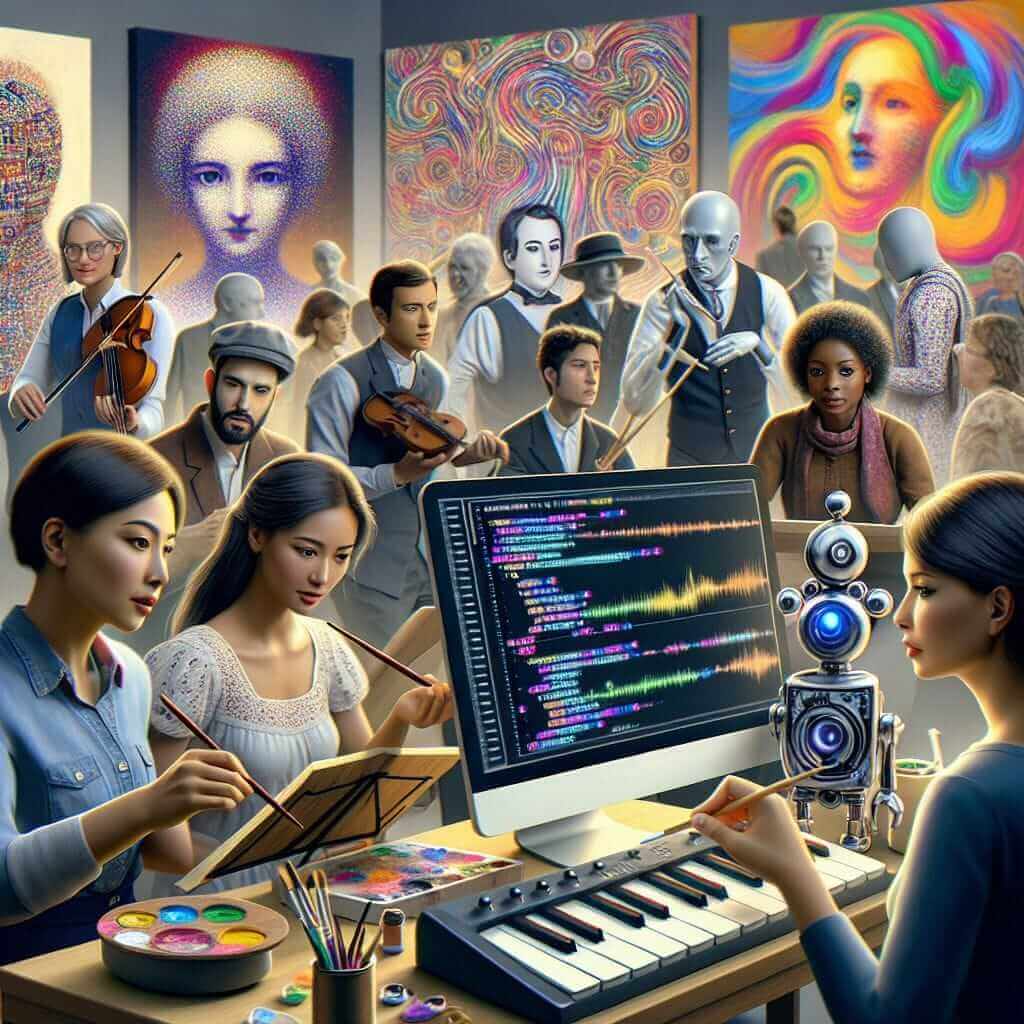The IELTS Reading section is known for its variety and complexity, often testing not only your understanding of the English language but also your comprehension skills on a wide range of topics. One such trending topic that has gained much attention is “How does artificial intelligence affect creative industries?” This article provides you with an in-depth reading passage and sample questions based on this topic, designed to replicate the actual IELTS exam. Understanding contemporary and relevant subjects like this can not only prepare you for the exam but also enhance your general knowledge.
This topic has gained popularity due to the continuous advancements in AI and its integration into various sectors, including the creative industries. Given its growing relevance, there’s a good chance you might encounter related themes in the reading section of your IELTS exam.
The Impact of Artificial Intelligence on Creative Industries
In the last decade, artificial intelligence (AI) has transformed numerous sectors, including the creative industries. The integration of AI in creative processes has led to significant leaps in efficiency, creativity, and innovation. From music composition to visual arts and even literature, AI’s role has become increasingly prominent.
AI in Music Composition
AI technologies like machine learning algorithms have been used to compose music. AI can analyze vast amounts of music data to identify patterns and create new compositions. Applications like OpenAI’s MuseNet have demonstrated the ability to compose original pieces that are difficult to distinguish from those created by human composers.
AI in Visual Arts
The impact of AI in visual arts has been transformative as well. Tools such as DeepArt and Google’s DeepDream have enabled artists to create complex and unique art pieces by leveraging neural networks. These AI applications can mimic artistic styles and even generate new styles, thereby pushing the boundaries of traditional art forms.
AI and Literature
Literature, too, has felt the influence of AI. Natural Language Processing (NLP) algorithms can write articles, stories, and poems. While the quality may vary, the ability of AI to create coherent text based on input has advanced considerably.
Ethical and Economic Implications
Despite the benefits, the integration of AI in creative industries also raises ethical concerns and economic implications. Questions about intellectual property, the value of human creativity, and job displacement are subjects of ongoing debate. While AI can assist and enhance creative processes, the full replacement of human creativity remains improbable due to the intrinsic uniqueness of human emotions and experiences.
Sample Reading Passage
The Future of Creativity: AI’s Influence on Art and Design
The landscape of creative fields is rapidly evolving due to advancements in artificial intelligence (AI). Various industries, including music, visual arts, and literature, are leveraging AI to innovate and enhance the creative process. One of the significant examples is the use of AI in music composition. Programs like OpenAI’s MuseNet can generate music in a variety of styles, blending classical and modern techniques seamlessly.
In visual arts, AI applications such as DeepArt and Google’s DeepDream are making groundbreaking contributions. These tools employ neural networks to create fascinating and intricate artwork, embracing both the parameters set by human users and the unique capabilities of AI.
Natural language processing has also found its place in literary arts. AI engines are now capable of drafting articles, essays, and even creative literature. While the narrative quality may still have room for improvement, the strides made in this area are nothing short of remarkable.
However, the growing role of AI in creative industries also brings forth several ethical and economic questions. How do we define the value of art created by machines? What rights do human creators retain in AI-generated content? Additionally, the potential for job displacement adds to the complexity of AI’s impact on creativity.
In summary, while AI presents extraordinary opportunities for innovation and creative expression, it also challenges existing paradigms, beckoning a reassessment of what it means to create and own art in the modern age.
Sample Questions
Multiple Choice
-
What is OpenAI’s MuseNet primarily used for?
a) Analyzing visual art
b) Composing music
c) Writing literature
d) Developing movies -
Which AI application is used for creating visual artworks?
a) OpenAI
b) MuseNet
c) DeepArt
d) Grammarly
True/False/Not Given
- AI has already completely replaced human creativity in literature.
- Ethical concerns regarding AI in creative fields include intellectual property and job displacement.
Matching Information
-
Match the following AI tools with their respective applications:
- MuseNet
- DeepArt
- NLP Algorithms
a) Visual Arts
b) Music Composition
c) Literature Creation
Summary Completion
- The role of AI in creative industries includes applications in __, __, and __. Ethical concerns such as __ and __ also arise due to this integration.
Answer Keys
- b) Composing music
- c) DeepArt
- False
- True
- MuseNet – b) Music Composition, DeepArt – a) Visual Arts, NLP Algorithms – c) Literature Creation
- The role of AI in creative industries includes applications in music composition, visual arts, and literature. Ethical concerns such as intellectual property rights and job displacement also arise due to this integration.
Common Mistakes and Tips
- Misinterpreting the main idea: Always ensure to identify the author’s main argument or the primary focus of the passage.
- Overlooking details: Pay attention to specific details that can help you answer True/False/Not Given questions accurately.
- Time management: Practice reading passages under timed conditions to improve your reading speed and manage your time effectively during the exam.
Vocabulary
- Algorithm /ˈælɡərɪðəm/ (noun): a set of rules for solving a problem in a finite number of steps.
- Neural Network /ˈnjʊərəl ˈnɛtwɜːrk/ (noun): a computer system modeled on the human brain and nervous system.
- Ethical /ˈɛθɪkəl/ (adjective): relating to moral principles or the branch of knowledge dealing with these.
Grammar Focus
Complex Sentences
A complex sentence contains a main clause and one or more subordinate clauses. This sentence type helps in developing a more detailed and richer text.
Example:
“While AI can assist and enhance creative processes, the full replacement of human creativity remains improbable due to the intrinsic uniqueness of human emotions and experiences.”
Tips for High Reading Scores
- Practice makes perfect: Regularly practice with IELTS reading passages to get familiar with the format and question types.
- Develop skimming and scanning techniques: These methods help you quickly identify the main idea and important details.
- Expand your vocabulary: A broader vocabulary will help you understand passages more easily and answer questions more accurately.
- Take practice tests: They help you become comfortable with the timing and pressure of the actual exam.
 Artificial Intelligence and Creativity
Artificial Intelligence and Creativity
By adhering to these strategies and consistently practicing, you can enhance your IELTS Reading skills and boost your overall performance in the exam.


